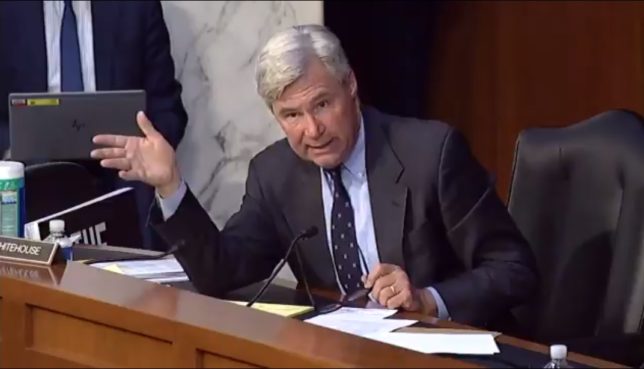Organization Trends
501(c)(4)s and “Dark Money”: “Dark Money” Usage
 Sen. Sheldon Whitehouse (D-RI) during Barrett confirmation hearing. Credit: @SenWhitehouse.
Sen. Sheldon Whitehouse (D-RI) during Barrett confirmation hearing. Credit: @SenWhitehouse.

501(c)(4)s and the Etymology of “Dark Money” (full series)
Evolution of (c)(4)s | Origins of (c)(4)s | Regulatory Struggles
A Definition of “Dark Money” | Donor-Advised Funds | “Dark Money” Usage
Appendix: Examples of “Dark Money” Usage in Public Discourse
“Expressing the sense of the Senate that dark money undermines the integrity of the judicial system and damages the perception that all people receive equal justice under law.”
—Title of S.Res. 759 (2020), introduced by Sen. Sheldon Whitehouse (D-RI) [For context, see Hayden Ludwig, “Sheldon Whitehouse’s Hypocrisy on Liberal “Dark Money” Isn’t Fooling Anyone.”
“Something is not right around the Court. And dark money has a lot to do with it. Special interests have a lot to do with it.”
—Sen. Sheldon Whitehouse (D-RI), speaking at Senate confirmation hearing for Justice Amy Coney Barrett, October 13, 2020
Meanwhile, a dark-money federal super PAC . . . spent nearly $750,000 launching a parallel attack against several of the same hardline Republicans.
“The Conservative Alliance PAC, which can raise and spend unlimited sums of money, targeted several House Republicans with mailers, radio ads and other attack ads.”
— Sean Murphy, “Oklahoma Republicans Targeted By Colleague, Dark Money,” Associated Press, September 27, 2018
“The great bulk of its funding has come from so-called dark money — funds from donors who are not legally required to reveal their names.”
—Alexander Burns, “With $30 Million, Obscure Democratic Group Floods the Zone in House Races,” New York Times, October 31, 2018
“Nonprofits that spend money to influence elections but are not required to disclose donors to the public—called ‘dark money’ groups by critics—no longer need to share their donors’ names or addresses in their tax filings under a new Treasury rule announced Monday.”
—Michelle Ye Hee Lee and Jeff Stein, “‘Dark Money’ Groups Don’t Need To Disclose Donors To Irs, Treasury Says,” Washington Post, July 17, 2018
“The state Senate budget committee is hours away . . . from voting on a bill that would force so-called ‘dark money’ groups to disclose their donors.”
It “would require 501(c)4 organizations to release names of donors if they spend more than $10,000 ‘influencing or attempting to influence the outcome of any election or the nomination, election or defeat of any person to any State or local elective public office or the passage or defeat of any public question.’”
—Ryan Hutchins and Katherine Landergan, “Lawmakers aim spotlight on ‘dark money’ groups,” Politico, January 17, 2019 (“New Jersey Playbook”)
“Sen. Angus King (I-Maine) told the Internal Revenue Service Wednesday to stop tax-exempt nonprofit organizations from influencing elections through anonymous donors.
“‘The increased prevalence of ‘dark money’ in electoral politics has been a troubling development in recent years, and the use of our tax code to shield the identities of donors represents one of its most egregious manifestations,’ King said. ‘It is time for an end to this dark money game.’”
—Ramsey Cox, “King to IRS: Stop ‘dark money’ in politics,” The Hill, February 20, 2014
“For the first time since the 2010 Citizens United Supreme Court decision, which struck down campaign spending limitations for corporations and unions, liberal ‘dark money’ groups outspent conservative groups, according to a new report from Issue One that analyzed data from the Center for Responsive Politics.
“Dark money groups spent $150 million in the 2018 midterms. And unlike super PACs, which must disclose their donors to the Federal Election Commission, these politically active nonprofits are not required to do so.”
—Simone Pathé, “Liberal ‘dark money’ groups spent more in 2018 than conservative groups,” Roll Call, January 23, 2019


